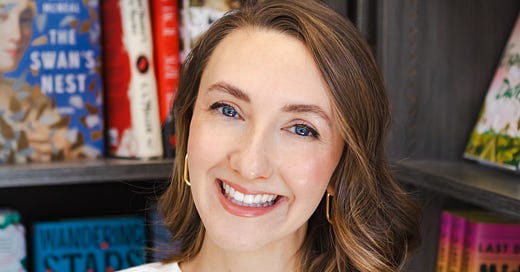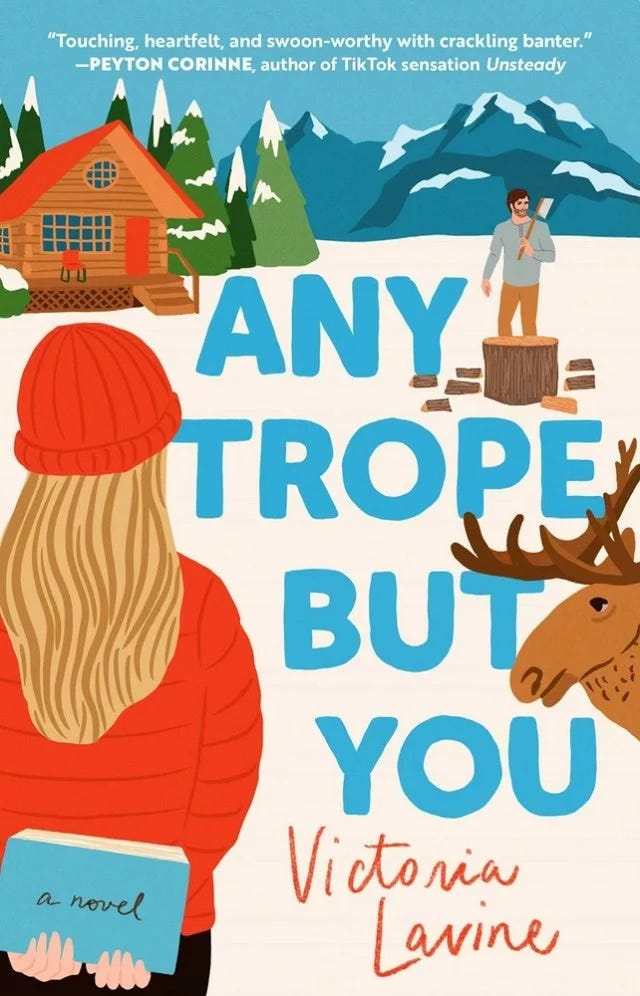I was introduced to Victoria last fall by my dear friend Elizabeth. We connected over Instagram and then realized that we live a block away from each other. I read her book through Netgalley and when we met for coffee she gifted me a physical ARC. My first ever!
She is a wonderful human. She is kind and generous and I felt connected to her moments after meeting. She has been so encouraging of my own writing and her belief has had a profound impact on me.
I have been talking about her book since I read it in October and now FINALLY, Any Trope but You comes out TOMORROW!
Trust me when I tell you that Victoria is the next Emily Henry, the next Abby Jimenez, the next Carley Fortune, the next Katherine Center….the next great romance author.
Today you get a peak at her writing process. I hope you enjoy!
Tell us a bit about yourself.
Victoria Lavine’s love of romance novels started in school with a crate of old bodice rippers and a wink from her local librarian. Now she writes her own Happily Ever After’s when she’s not enjoying the great state of Maine with her husband and daughter, taking orders from her two cats, or coming up with excellent reasons to make her next latte.
Do you have any writing rituals? Do you write from the same physical location, start your time with a walk, light a candle, listen to certain music?
I definitely have some rituals around writing, but as I'm currently 37 weeks pregnant, some of those have had to be adjusted! For instance, I usually alternate sitting and standing at my office desk with a timer, but these days, my chair is a birth ball at my kitchen table, my office is becoming a nursery, and sometimes I just glare at my timer when it tells me to stand up. Thankfully, my new home office is a sunny nook I'm really looking forward to moving into, and I won't be pregnant for much longer!
As for other rituals, my day kicks off after my daughter leaves for school. Once I'm at my desk, I spend time in my email and work on whatever non-writing tasks I've got on my plate. Depending on what stage I'm at in a book, these could be anything from approving promotional materials from my publisher, reviewing cover art or design, creating content for social media, or writing long-winded thank-you emails to my team for being so awesome. Then (usually after lunch) I get to the best part of my day: writing! Sometimes "writing" means drafting new words, but I spend most of my time revising, revising again, and approving copyedits.
Throughout the day, I rely heavily on my little visual Time Timer to make sure I get up and move my body (it also jogs my brain). I usually do 30-minute 'work sprints' either sitting or standing, then give myself a few minutes to mindlessly scroll socials or grab a snack before switching positions. Some days I'm definitely better at sticking to this than others, but on the days that I do, I'm at my most productive.
I outlined the story for what is now ANY TROPE BUT YOU and discovered that figuring out the basic plot, wounds, and character arcs for my characters *before* writing the book was a game changer for me*.
On this note, are you a panster, plotter, or planster?
I used to be a die-hard panster because of Steven King's advice in "On Writing." But thanks to that approach, the first book I ever wrote was a 140,000-word behemoth that I only managed to cut down to industry-standard length through many tears and much suffering.
When I signed with my brilliant agent, Jess Mileo, she put an end to all that by requiring an outline for my next book. It was the tough love I needed. I outlined the story for what is now ANY TROPE BUT YOU and discovered that figuring out the basic plot, wounds, and character arcs for my characters *before* writing the book was a game changer for me*. I drafted the story in less than half the time of my first book, and it ended up being so much stronger.
I still make sure to leave plenty of wiggle room in my outlines for my characters to misbehave and go off-script, but outlining has streamlined the whole process for me.
*I say "for me" because obviously every brain works differently. As a chronic over-writer, I just can't be trusted to skip into a blank document without a plan, but lots of people clearly thrive as pansters or plantsers! In the end, it's a 'you do you' situation, but trying a variety of approaches when you're just starting out is helpful.
When I envision what it must look like when a writer starts writing all I can think is that you sit down at the computer, a blank document open, and the story just pours out of you.
Is this how it happens? How do you actually start writing? Do you always work on the computer or write with pen and paper? Tell me everything.
As mentioned above, I can't be trusted with a blank document and a 'let's see where the wind takes us!' attitude--not unless I want to end up with the Moby Dick of just-vibes and horny pining (again). So these days, a lot goes into planning a book before a single word is written.
Because I write contemporary romance, my first step is making sure I have a really strong, high-concept hook. There are tons of articles out there defining what this is, but basically, can you describe your book concept in one short, attention-grabbing sentence (or title even)? A great example of this is "Jurassic Park." You get the whole idea in two words.
Once my hook is solid, I expand it to a short pitch (like a query letter, or back-of-book copy). If this is approved, I move on to fleshing out my main characters by figuring out their core wounds and misbeliefs (I really like the backstory excavation exercises in Lisa Cron's "Story Genius" for this). From here, I move on to the outline (I usually write a paragraph or two for each chapter).
Once the outline is approved, I move on to drafting at last! By this point, my characters sort of feel like online friends that I'm finally getting to meet IRL. It's *so* much fun to find their voices and quirks, and 'meet' them in full color.
Honestly, the way I study craft is by reading great books. Is it an unputdownable page-turner? If so, I might look at what the author did to leave the reader hanging after each chapter. Does the prose have me sighing and re-reading passages because they're so beautiful/poignant? Then I'm looking at how the author used language, sentence flow, and all 5 senses to create that immersive experience.
When do ideas come to you and where do you keep them until you are ready to use them? Do you have a dedicated notebook? Do you utilize the notes app in your phone?
I wish I could say I kept an ideas notebook--how romantic! But, I do have a Google Doc of potential concepts to explore. Maybe the time is ripe to go notebook shopping, though!
What resources do you turn to for inspiration and to learn about the craft of writing?
Honestly, the way I study craft is by reading great books. Is it an unputdownable page-turner? If so, I might look at what the author did to leave the reader hanging after each chapter. Does the prose have me sighing and re-reading passages because they're so beautiful/poignant? Then I'm looking at how the author used language, sentence flow, and all 5 senses to create that immersive experience.
I also mentioned loving Lisa Cron's craft book, "Story Genius." While I don't do the scene cards or anything, I think her concept of the "third rail" really is genius, and her exercises for character discovery are wonderful. I also think Steven King's "On Writing" has some great advice on cutting fluff to get to the story and general craft tips (even if I don't agree with his stance that every writer should be a pantser).
Last, but certainly not least, what are you reading right now?
Right now I'm on a big Kennedy Ryan kick. If you want to be emotionally clotheslined in the best way possible, her Skyland series is a must-read. I'm also really excited to start reading books from my fellow 2025 debut romance authors!
Where can people find you. Instagram, Substack, website. Share it all so we can follow everything that you do!
Substack:
Instagram: @victorialavinewrites
Website: www.victorialavine.com
Be sure to check out past editions of Writers on Writing.






